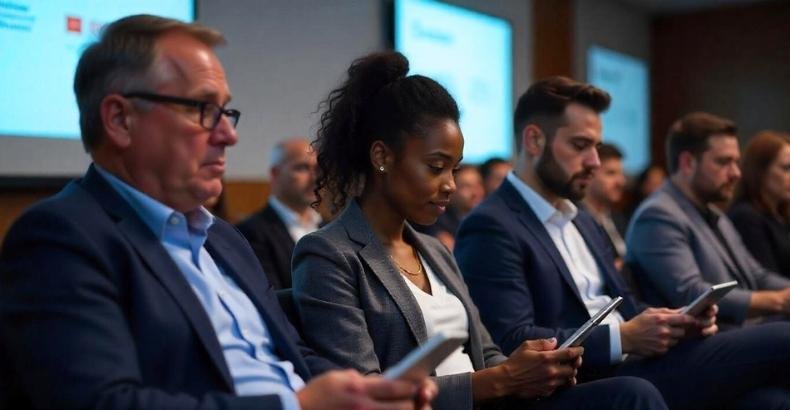The network and knowledge sharing that takes place at business conferences are essential in the current business environment. They provide professionals with the opportunity to connect with industry leaders, learn about the latest trends, and gain valuable insights. As you get ready for these significant events, you might be wondering, “How do I prepare for upcoming business conferences?”
To prepare effectively, start by defining your objectives. Identify what you want to achieve, whether it’s expanding your network, learning about industry advancements, or meeting potential collaborators. Familiarize yourself with the conference agenda, prioritize sessions, and create a networking strategy to connect with key individuals. Ensuring that your professional materials are updated is also vital for making a strong impression.
Still curious about upcoming business conference preparation? This article provides detailed tips and strategies for preparation. Dive in to discover essential information that will help you succeed at your next business conference!
Why Preparing for Business Conferences is Essential?
Preparing for business conferences is essential to maximize the benefits they offer. Proper preparation helps participants navigate the event more confidently and ensures they gain meaningful insights, connections, and opportunities. Arriving unprepared can lead to missed interactions and less impactful experiences.

Before attending, you have to set clear objectives. Knowing what you hope to achieve, whether it’s networking, learning from industry experts, or finding business partners, allows you to stay focused. Researching the event’s speakers and sessions also ensures that you prioritize the most relevant parts of the conference.
If you’re heading to an upcoming business conference in Canada with an invitation letter, preparation becomes even more critical. Double-checking travel arrangements, visa requirements, and accommodations ahead of time can help prevent last-minute stress. Additionally, preparing questions or discussion points enhances your engagement during panels or workshops.
How Do I Prepare for Upcoming Business Conferences?
Getting ready for business conferences can improve your knowledge acquisition and networking considerably. A well-planned approach ensures that you maximize the value of these events. Here are essential steps to help you get ready and make the most of your experience.

Clear Objectives
Before attending a conference, define your goals. What do you want to achieve? This could be expanding your network, learning about industry trends, or finding potential collaborators. Having clear objectives will guide your activities during the event. Write down your goals and keep them in mind as you go through the conference. This focused approach will help you make more meaningful connections and gather relevant information.
Research the Conference Agenda
Take the time to familiarize yourself with the conference agenda. Look for keynote speakers, breakout sessions, and networking opportunities that align with your interests and goals. Prioritize the sessions you want to attend. Learning about the schedule allows you to plan your time effectively and ensures you don’t miss out on valuable insights. Additionally, you can identify speakers or topics that you might want to discuss with other attendees.
Prepare Your Networking Strategy
An essential element of any business conference is networking. Create a strategy for connecting with other attendees, speakers, and exhibitors. Bring plenty of business cards to share, and consider preparing a brief introduction about yourself. Identify individuals or companies you want to connect with beforehand. Engaging in meaningful conversations can lead to future opportunities and collaborations. Being active in networking increases your chances of forming lasting professional relationships.
Update Your Professional Materials
Ensure that your resume, LinkedIn profile, and any other professional materials are up to date before the conference. This will help you present yourself confidently when meeting new contacts. Consider creating a digital portfolio showcasing your work, achievements, or projects relevant to the industry. Having these materials readily available can improve your discussions and make a strong impression on potential connections or employers.
Plan Your Travel and Accommodation
Make necessary travel and accommodation arrangements well in advance. Consider factors such as location, budget, and convenience. Booking early can often save you money and ensure you have a comfortable stay. Check if the conference offers special rates for attendees at nearby hotels. Proper planning in this area can reduce stress and help you focus on the conference activities rather than logistical concerns.
Engage on Social Media
Take advantage of social media to improve your conference experience. Follow the event’s official accounts and engage with other attendees online. Use event hashtags to participate in discussions and share insights. This not only helps you stay informed but also increases your visibility among peers. Social media can be an effective tool for arranging meetups and providing connections before and during the conference.
Follow Up After the Conference
After the conference concludes, take time to follow up with the contacts you made. Send personalized messages to thank them for their time and share insights from your conversations. This can solidify your new connections and open doors for future collaboration. Consider scheduling a follow-up meeting or call to discuss potential opportunities. A thoughtful follow-up demonstrates your professionalism and commitment to maintaining the relationships you built.
Thorough preparation can significantly enhance your experience at business conferences. By following these strategies, you can ensure that you make the most of your time and resources, leading to lasting benefits for your career.
What to Wear for a Business Conference?
Choosing the right outfit for a business conference is crucial for making a great first impression. The attire you select can influence how others perceive you and can enhance your confidence. Here’s a breakdown of what to consider when dressing for success.
Awareness of the Dress Code
Before deciding what to wear, understand the dress code for the event. Conferences can vary in formality, with some requiring business formal attire and others leaning toward business casual. Check the event website or reach out to organizers for guidance. This will help you feel appropriately dressed and comfortable throughout the conference.
Prioritizing Comfort
While looking professional is important, comfort should also be a top priority. Conferences often involve long hours of sitting, walking, and networking. Choose fabrics that allow for movement and breathable materials to help you stay comfortable. This consideration is particularly important if you are attending a business conference for the first time and may be unfamiliar with the day’s demands.
Choosing Appropriate Footwear
Shoes can significantly impact your overall comfort and appearance. Go for shoes that are professional yet comfortable for extended wear. Avoid high heels or overly formal shoes that may cause discomfort after hours of standing or walking. Selecting the right shoes is especially essential for those new to attending conferences, as you will want to focus on networking rather than discomfort.
Accessories That Increase Your Look
Adding accessories to your outfit can improve your look and showcase your personality while still maintaining a professional appearance. Opt for items like a classic watch, understated jewelry, or a chic bag that enhances your overall ensemble. It’s best to keep accessories subtle to prevent them from becoming a distraction, ensuring a polished and refined appearance.
Preparing for Weather and Venue
Always check the weather forecast and be mindful of the venue’s climate. Layering can be a practical approach to adapting to changing temperatures throughout the day. A light blazer or cardigan can be useful for chilly conference rooms. Attending for the first time requires understanding the environment, ensuring you’re prepared.
Dressing appropriately for a business conference is crucial. It reflects your professionalism and helps you feel confident. By considering comfort, style, and the event’s requirements, you can make a lasting impression and enjoy a more fulfilling experience.
Common Mistakes to Avoid When Preparing for Business Conference
Participating in a business conference can be a beneficial experience, but poor preparation can block your success. Avoiding common pitfalls can lead to a more successful and enjoyable event. Here are some key mistakes to watch out for when getting ready.
- Neglecting Research: Failing to research the conference agenda and speakers can leave you unprepared. Knowing the topics and presenters helps you select sessions that align with your interests and goals.
- Ignoring Networking Opportunities: Many attendees overlook the importance of networking. Building connections is crucial for career growth, so be proactive in meeting new people and exchanging contact information.
- Not Setting Clear Goals: Without specific objectives, you might wander aimlessly at the conference. Setting clear goals ensures that your time is well spent and allows you to measure your success afterwards.
- Forgetting Professional Materials: Leaving behind business cards, resumes, or promotional materials can limit your networking potential. Always bring sufficient supplies to share your information with others you meet.
- Overcommitting Your Schedule: Trying to attend too many sessions can lead to burnout. Prioritize your agenda and leave time for breaks to recharge and reflect on what you’ve learned.
- Being Unprepared for Conversations: Not preparing an elevator pitch can hinder your ability to make a strong first impression. Take time to craft a brief introduction that clearly conveys who you are and what you do.
- Neglecting Follow-Up After the Event: Failing to follow up with new contacts can waste networking opportunities. Sending a quick thank-you note or connecting on LinkedIn keeps the conversation going and helps build relationships.
Avoiding these common mistakes can significantly enhance your conference experience. Thoughtful preparation will allow you to focus on making connections and gaining valuable insights, leading to opportunities that can benefit your career in the long run.
Tips for Effective Note-taking During Sessions
Effective note-taking during business conference sessions can be a game-changer for retaining key information and insights. It allows you to stay organized, capture crucial ideas, and reflect on what you’ve learned long after the event is over. Let’s dive into some strategies.

Preparing Your Materials
Before the conference begins, make sure you have everything you need to take notes efficiently. Whether you prefer a digital device or a traditional notebook, being prepared is key. Having a plan for your note-taking helps you stay focused on the key goals of business conferences, such as networking, learning, and idea exchange.
Organizing Notes by Topic
One effective way to make your notes more useful is by organizing them by topic or session. Label each section clearly so you can easily refer back to it later. This method not only keeps things tidy but also allows you to align your notes with the various objectives of the conference.
Focusing on Key Points
Rather than writing down everything, focus on capturing the main ideas and key takeaways from each session. Writing down important quotes, statistics, or ideas will make your notes more impactful. This helps you stay aligned with the purpose of the conference, as it’s easy to get overwhelmed by too much information.
Using Abbreviations and Symbols
Speeding up your note-taking process by using abbreviations and symbols can make a significant difference. This allows you to capture more information in less time and ensures that you don’t miss important points during fast-paced discussions. The goal is to create notes that you can easily revisit and expand upon.
Reviewing and Refining Your Notes
After each session, take a few minutes to review and refine your notes. Adding any missing details or organizing them further can help solidify your knowledge. This post-session reflection also gives you a chance to relate the notes back to your personal or professional objectives.
Effective note-taking helps you absorb and apply the valuable insights shared during a conference. By staying organized, focusing on key points, and refining your notes, you can turn your conference experience into actionable knowledge that supports your growth and objectives.
Frequently Asked Questions (FAQs)
Preparing for a business conference can be challenging, especially if you’re not sure where to start. From packing essentials to managing time effectively, there’s a lot to consider. Below are some frequently asked questions to help guide your preparation and ensure you’re ready to make the most of your experience.
What Should I Pack for a Business Conference?
Business cards, a notepad, a portable charger, and professional clothing are musts when preparing for a business meeting. Also, bring any presentation materials, healthy snacks, and personal care items. Having these essentials will help you stay organized, comfortable, and ready to engage with fellow attendees.
How Can I Stay Energized During Long Conference Days?
To maintain your energy during long conference days, ensure you get proper rest before the event. Stay hydrated, take short breaks whenever possible, and carry nutritious snacks like nuts or fruit. Additionally, mixing engaging sessions with networking opportunities can help you avoid burnout while keeping your energy levels high throughout the day.
What’s the Best Way to Follow Up After a Conference?
Following up with new contacts within 48 hours after a conference is vital for building relationships. Send personalized emails or connect on LinkedIn, referencing specific discussions you had. This shows genuine interest and helps keep the conversation going, paving the way for future collaborations and networking opportunities.
How Can I Manage My Time Effectively at a Conference?
Effective time management is crucial for a successful conference experience. Prioritize must-attend sessions while leaving time for networking. Utilize event apps to track your schedule and set aside breaks for rest and reflection. Staying flexible yet focused allows you to maximize productivity and enjoy all that the conference offers.
How Do I Stay Updated on Conference Changes or Announcements?
To stay updated on conference changes or announcements, subscribe to email alerts or download the official event app. Many conferences also post real-time updates on social media. Following relevant hashtags or accounts ensures you remain informed about any last-minute changes, helping you adjust your plans accordingly.
End Note
As you gear up for your next business conference, remember that thorough preparation is the key to success. Taking the time to organize your materials, plan your schedule, and set clear objectives will greatly improve your overall experience. A well-prepared attendee not only gains valuable insights but also makes meaningful connections that can lead to future opportunities.
To effectively answer the question, “How do I prepare for upcoming business conferences?” focus on defining your goals, researching the agenda, and creating a networking strategy. Organizing your professional materials and planning your travel arrangements can further streamline your experience. By being active and intentional in your preparation, you’ll position yourself to make the most of every moment at the conference.
Have a well-thought-out plan and approach your next conference with enthusiasm. Keep in mind to stay hydrated, take notes, and network actively. Best wishes for a successful event where you can learn, connect, and grow in your professional career!